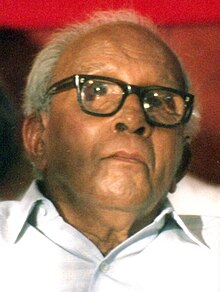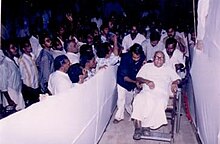E. M. S. Namboodiripad

E. M. S. Namboodiripad, born Elamkulam Manakkal Sankaran Namboodiripad, (Malyalam: ഏലങ്കുളം മനക്കല് ശങ്കരന് നമ്പൂതിരിപ്പാട്; June 13, 1909 – March 19, 1998), popularly called E. M. S., was an Indian Communist leader, Socialist-Marxist theorist, revolutionary, author, historian, and social commentator. He was the first non-Indian National Congress Chief Minister in Kerala in the Republic of India as the leader of the first democratically elected Communist government in India.
Quotes
[edit]- Elements of Gandhism were by and large inherent in my life style and mode of thinking even after I adopted Marxism. While expressing my ideological difference with Gandhism, I became a political activist who upheld the high values of Gandhism and tried to translate them in my personal lifestyle.
- Namboodiripad, E. M. S. (2010). The Mahatma and the Ism. LeftWord Books. p. 10. ISBN 978-81-87496-98-4.
- ...engaged themselves in mainly exposing the policies and programmes of the bourgeois leaders including Gandhi without participating in these struggles and sharing their bitter experience. The result was that the bourgeois leadership and the people were getting closer to each other.
- On the early communist sectarianism of the 1920s quoted in "The Mahatma and the Ism" in page=9.
- Sankara was one of the tallest of India's (and the world's) idealist philosophers; his Advaita Vedanta is one of the richest contributions India has made to the treasury of human knowledge.
- ...the Buddha whose near-materialist philosophy gripped the mass of suppressed humanity…those belonging to the materialist school had to fight an unequal fight and were therefore defeated...the defeat of the materialists in this unequal battle was the beginning of a millennium-long age of intellectual and socio-political backwardness which culminated in the establishment of British rule in our land.
- Above two quotes written in his book “History, Society and Land Relations” after paying a tribute to Shankara he points to the non-idealist streams of ancient Indian philosophy, above two quotes are in "A Socialist who became a Communist". The Hindu. 20 April 2010. Retrieved on 13 December 2013.
- I am proud of my individuality as a Communist that |Arundhati sees as a flaw and my lack of deviant sexuality that Arundhati sees as a matter of credit,
- The author has accused her own mother of indulging in deviant sexuality. Yet, Mary Roy takes pride in the "beautiful work" by her daughter. "Why is it so?"
- Above quotes on Arundhati Roy’s novel "The God of Small Things" in which she had criticized E.M.S. cited in EMS attacks literary content of Arundhati Roy's novel. Rediff.com (29 November 1997). Retrieved on 13 December 2013.
- When we own up our mistakes some people interpret it as if we are wrong. They too commit mistakes.
- Quoted in Quotations by 60 Greatest Indians. Dhirubhai Ambani Institute of Information and Communication Technology.
History, Society, and Land Relations: Selected Essays
[edit]Namboodiripad, E. M. S. (2010). History, Society, and Land Relations: Selected Essays. LeftWord Books. ISBN 978-81-87496-92-2.
- As opposed to this two-stage transformation-slave to feudal and feudal to capitalist-in Europe, India remained tied to the same old order under which the overwhelming majority of the people belonged to the oppressed and backward castes. This is the essence of what Marx called India’s ‘unchanging’ society where the village was not touched by the wars and upheavals at the higher levels, the British conquest being the first revolution.
- Why and how did our country fall from its brilliant antiquity to the degradation of pre-British days? The answer is that defeat of the oppressed castes at the hands of the Brahminic overlordship, of materialism by idealism, constituted the beginning of the fall of India’s civilization and culture which in the end led to the loss of national independence.
- Above two quotes are on Adi Sankara’s success of idealism vis-a-vis materialism in page=11.
- We had then and still have to fight a two-front battle. Ranged against us on the one hand are those who denounce us for our alleged ‘departure from the principles of nationalism and socialism’, since we are championing ‘sectarian’ causes like those of oppressed castes and religious minorities. On the other hand are those who, in the name of defending the oppressed caste masses, in fact, isolate them from the mainstream of the united struggle of the working people irrespective of caste, communities and so on.
- On special role of caste in Indian society in page=12.
EMS As A Literary Critic And Cultural Activist
[edit]
His interpretation on the literary, artistic and cultural life of Kerala, his interventions expressing his views intellectual and literary controversies in Malayalam literature EMS As A Literary Critic And Cultural Activist in Marxists Volume: 14, No. 01-02 Jan-June 1998. CPIM Organization. Retrieved on 13 December 2013.
- When we own up our mistakes some people interpret as if we alone were in the wrong. The fact is that just as we did, they also committed mistakes. If in the debate on Roopa Bhadrata we erred, people like Mundassery also erred equally.
- It is the fact of life that a truth emerges out of a conflict between two wrongs. The development of society is through contradictions. Thus the Roopa Bhadrata argument which arose out of our conflict was wrong, in another sense it was correct too. Evaluating the worth of literature we should never confine ourselves to content alone. Mundassery was correct in insisting that form too is to be evaluated. In his own words it is not enough to have perfect content, it must also have perfect form. That is Roopa Bhadrata. Is that not correct? Yes, it is. We accept that we were wrong on that count. Those of us who founded the Jeevat Sahitya Sanghom were political workers. We looked at literature too through political eyes. So we did not pay sufficient attention to the artistic structure of literature. That was our mistake.
- But when people like Mundassery tried to correct us, they viewed form and content as two separate categories and argued for perfection in both. That was their theory. In fact the form and content are not so separate of conflicting categories. For progressive content there must be progressive form. The progressive form is the same as perfect form. Those like Mundassery did not realize the relation between the two.
EMS as a historian
[edit]EMS as a historian. Frontline. Retrieved on 13 December 2013.
- This new theory of Dravidian superiority is as unscientific as the theory of Aryan superiority. For, it goes against all the accepted conclusions of historical research, which have conclusively proved the indivisible links between social and family institutions on the one hand and the stage of civilization on the other.
- On the issue of pre-Aryan inferiority or Aryan superiority
- It is far from the truth to say that the rebellion was a communal riot, that the objective of the rebels was the destruction of Hindu religion and that the six months of rebellion were six months of anti-Hindu atrocities... All this, however, does not mean that religious fanaticism was totally absent in the rebellion. The numbers of forced conversions which did take place cannot by any stretch of imagination be explained by any other motive than religious fanaticism... One can and should, however, state explicitly that the main force behind the rebellion was not fanaticism which was simply a by-product...
- On the issue of the Malabar rebellion
- Like several other historical personages, Gandhi had a highly complex personality, his teachings, too, are incapable of over-simplified assessments on the lines of his being 'the inspirer of the national movement who roused the masses to anti-imperialist action', 'the counter-revolutionary who did all he could to prevent the development of our national movement on revolutionary lines', etc."
- associated himself with the masses, their lives, their problems, sentiments and aspirations.
- Above two quotes are his assessment of Gandhi.
About E.M.S.
[edit]
- Namboodiripad's engagement with history was not academic but an inevitable part of his involvement with politics.
- Quoted in "EMS as a historian".
- Namboodiripad was by birth a brahmin,that too from the most exclusive and ancient namboodiri community of kerala,yet if he had not been from this community,communism leave alone E.M.S the man would have never become a by-word in Kerala
- Chandrashekarendra Saraswati,68th Jagadguru of the Kanchi Kamakoti Peetham
- EMS was uniquely positioned to analyze the various phases of the national movement and the role of Gandhi. He began his political life as an ardent Gandhian. Through out his life, while d adhering to the Marxist world outlook, he practiced many of the Gandhian principles of simplicity and personal austerity that are cherished by Indians.
- Praksah Karat in “EMS on Gandhi” quoted in "The Mahatma and the Ism" in page=8.
- Between December 1991 and March 1998, octogenarian E.M.S. Namboodiripad wrote 128 columns for Frontline on an impressive-indeed awesome-range of subjects. For these seven years and more, his was simply the most dependable contribution from the standpoint of the editorial desk....He was a Master at handling history on the wing...EMS wrote one column a month for Frontline.... ‘Perspective’, the EMS column ranged over politics, philosophy, economics, education, social movements, literature, cultural affairs, religion and books.
- N.Ram on EMS, the columnist, quoted in Namboodiripad, E. M. S. (2010). The Frontline Years: Selected Articles. LeftWord Books. p. 11. ISBN 978-81-87496-93-9.

- E.M.S. Namboodiripad straddled the history of twentieth century Kerala and the Indian Communist movement in a manner which invokes awe. The word ‘history’ is what recurs in the Malayalam media while paying tributes to him. History maker, history’s man, epochal figure: these are some of the terms which underline the recognition that EMS was something bigger than a political leader.
- Prakash Karat quoted in "The Frontline Years: Selected Articles" in page =13.
E.M.S.Namboodiripad was defeated in the public elections only once. That was during 1952 when he lost to K.P.Kuttikrishnan Nair (the founder leader of Trade Union Movement in India) of the Indian National Congress by a huge margin from the Kozhikode constituency. No other leader could ever defeat E.M.S.Namboodiripad throughout his life span. E.M.S.Namboodiripad and Kuttiettan were the best of friends and their fight was a tight one of those days as both were well popular among the general public. Kuttiettan and his best friend C.K.Govindan Nair (CKG) were the Congress leaders who had even outrightly rejected Nehru's mandates regarding candidature in Kerala, openly holding that as the State Congress Committee leaders, they knew whom to field and they did not need advice from the AICC (the High Command). Kuttiettan earned the nickname the Giant-Killer from Jawaharlal Nehru after defeating E.M.S.Namboodiripad and Seethi Sahib.
- E.M.S. Namboodiripad was a leader who equipped Communist parties to handle governance in a bourgeois system.
- He also created opportunities for Kerala to prove its capabilities at the national and international levels.
- Above two quotes of Achuthanandan cited in . The Hindu. 20 March 2009. Retrieved on 13 December 2013.

